
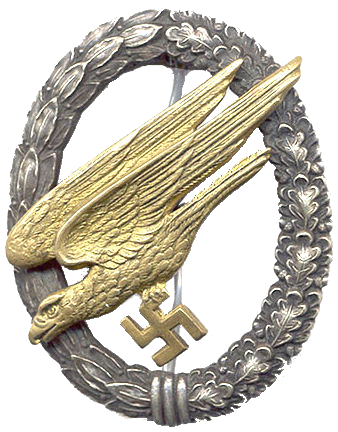
This interview was done with Fallschirmjäger (paratrooper) Willi Koch, Knight's Cross winner, Kaiserslautern, 1988.
[Above: Willi Koch]
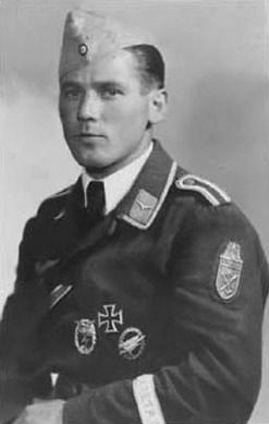


This interview was done with Fallschirmjäger (paratrooper) Willi Koch, Knight's Cross winner, Kaiserslautern, 1988.
[Above: Willi Koch]

Thank you for agreeing to finally meet with me, I would like to start by asking what brought you to the Fallschirmjäger branch of the Luftwaffe?
Willi: Yes, German youth were raised to respect our armed forces and I wanted to live the soldier’s life. A new idea was sweeping Germany in the thirties; Hitler was rebuilding the non-existent air force, and Göring was wanting a Fallschirmjäger branch. I was able to join the Regiment General Göring, which at first was more a flak and bodyguard unit. Many former police joined out of loyalty to Göring.
When I joined, all ideas were brand new, as no one had ever put a unit like this together before. Some of our instructors had been able to test their ideas in Russia, and brought back the knowledge. Göring was very proud of us, and always could be seen checking in on our training. By 1938, we split off into an independent Fallschirmjäger arm and received a new commander who would go on to be quite famous in the war, Oberst Brauer.
How was the news of war received, and what did you experience in Poland?
Willi: All Germans who lived back then will tell you that Poland was a bastard state forced on the Reich by Versailles. Prussia and Russia had rights to govern the land, and Versailles took that away, and caused the Polish people to become hostile to both nations. The reds did try to invade Poland and Europe, which the brave Poles stopped, but the Poles also set their sights on territory that was still German.
There were many border incidences from 1919 going into 1939, a full twenty years. When Hitler was elected, he publicly renounced any claims against former lands in Poland, seeking to talk Poland into returning some of the land through trade deals, but Britain was adamant to deny this. It is my opinion that Germany did everything correct with Poland, even the intervention of 1939 that was forced on us.
I read accounts in the papers of the testimonies of German refugees fleeing Polish persecution, caused solely because they were of German descent. Some of these were women and girls who had their menfolk killed by Polish criminals, and sought refuge in the Reich. To the Führer and the Reichstag, this had to stop, and this is why we had to intervene, as the Polish government was more interested in hanging on to their borders than protecting minorities and making compromises.
German forces, including Fallschirmjäger rgt. 1 went into Poland in 1939 and put a stop to the border attacks and killings of Germans. It was with a strong sense of duty and excitement, yet with a heavy heart that we went to war. For many, when the Allies declared war, it was the chance to correct Versailles and do what our fathers were not able to do. Our units were welcomed in many towns and villages as liberators.
How did you view the Polish soldier?
Willi: The Polish soldier was seen as mostly professional, but not well organized and prone to fight on his own. There were many soldiers of German descent, and they fought well, and later came to join us. We had a very strict code to fight under, meaning no tricks, but the Polish soldier used every trick they could which sometimes brought harsh reprisals. Soldiers who acted as if they were surrendering; only to open fire when our weapons were lowered tricked my unit causing causalities.
Poland was my baptism of fire, and sadly, we did not get to jump during this action, but were used as infantry, taking on Polish cavalry and stragglers who refused to quit. We went out of our way to help the many stragglers stay away from the Russians, who early on, had a reputation of being cruel to the Poles. They helped us remove valuable metals so the Russians did not have access to them. This went on until the end of October. Many Polish civilians fled the Russians and sought protection under German rule.
You mentioned you were part of the Narvik jump, what was this like?
Willi: Our efforts in Norway were mainly to get them to surrender without fighting, but of course, no one likes it when you walk in the door uninvited. I learned that many German officers tried to get the Norwegians to understand we were there only to stop the British from invading and severing our rail lines. Many units did not fight, and laid down their arms quickly, others did not. In Narvik, the Allies landed after German units, and laid siege to them. We jumped to join forces and bolster the defense.
I can tell you it was very cold and the weather did not sit well with me, we had received cold weather training but I was not prepared to be there so long. The Allies had us cut off, but General Dietel was brilliant in having small battle groups go out and capture key areas. Our Luftwaffe kept us supplied, and morale was high once we learned the ground war was happening in France. As May wore on less and less soldiers were seen, as they were pulled out. At one time we faced over 25 thousand with our force of 5 thousand.
We utilized every bit of equipment we had to survive, and at times the front was quiet and peaceful with some Norwegians sneaking up to give us food. We were close to Sweden and some supporters were able to sneak over supplies and food as well which was appreciated. This episode did not last long, I was sent on to join the landings in Holland, which was just as bad. I did win the Iron Cross of both classes there. The Dutch fought well and gave us many casualities, but we had better training and air support. I was now considered a combat veteran and was sent to school to become an NCO.
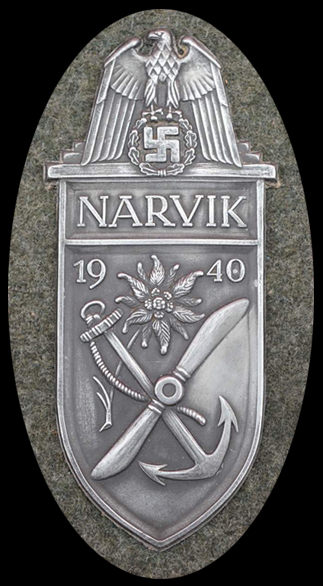
[Above: You'll notice on Koch's arm is the Narvik Shield, a military decoration awarded to all German forces that took part in the battles of Narvik between April 9 - June 8, 1940.]
Willi: Not good, Crete was a bloody battle for the Fallschirmjäger, and many good comrades were lost. My regiment was moved south into Greece, which was quite a trip. Everyone had a different idea of where we were to be used next, Africa was logical. I followed the news however, and it was obvious to me that Crete posed a problem for our plan to oust the British from the Mediterranean. Everything was kept so strict and quiet; we had to conceal armbands and units. I am surprised we could go off base to attend dances by the gypsies, and sightsee, but this was closely monitored.
By early May, all the men were in place, and hundreds of planes were scattered at airfields and I knew it would be soon. In my mind, I knew Crete was our target so I studied maps that I could get from books. The war was going very well for us, and I had much confidence we would smash the Allies. We were not told of our target until the day before, and then were confined to base. The next day we loaded on JU 52s, I was excited to see many Stukas, and ME 110s taking off.
Something that might be interesting to you is that I was shown a report from Berlin that spoke about what to expect from the civilians. It stated they were hot-tempered, prone to criminal acts, and even though the Greek government disarmed them in 1938, they still had many weapons. This would prove dastardly for many Germans later on. We took off with not much fanfare; we were stoic and ready to face our fate. My regiment was to take areas around Chania and Heraklion.
The trip over seemed very fast, we could hear the flak firing at our group, then it was time to go. The Allies fired on us as soon as we jumped, I was yelling for the wind to hurry me down. I could see my comrades in the distance coming down, some did not move, as they were dead. German units landed in the midst of a very large Allied position that missed detection. Most of the men in both waves were either killed or wounded. It was only through determination and luck that we held on until ground units saved us.
We gave the enemy a very bloody nose as well; we learned to use our grenades to devastating effect. The fighting on Crete was ferocious and at times at very close range, I had to watch many of my friends die. We were able to finally overpower the larger Allied force and gain victory, but it was a heavy price to pay, and it left us with a feeling of disgust for how this battle was fought. A few Cretans actively aided the enemy, and committed savage acts against our wounded and prisoners.
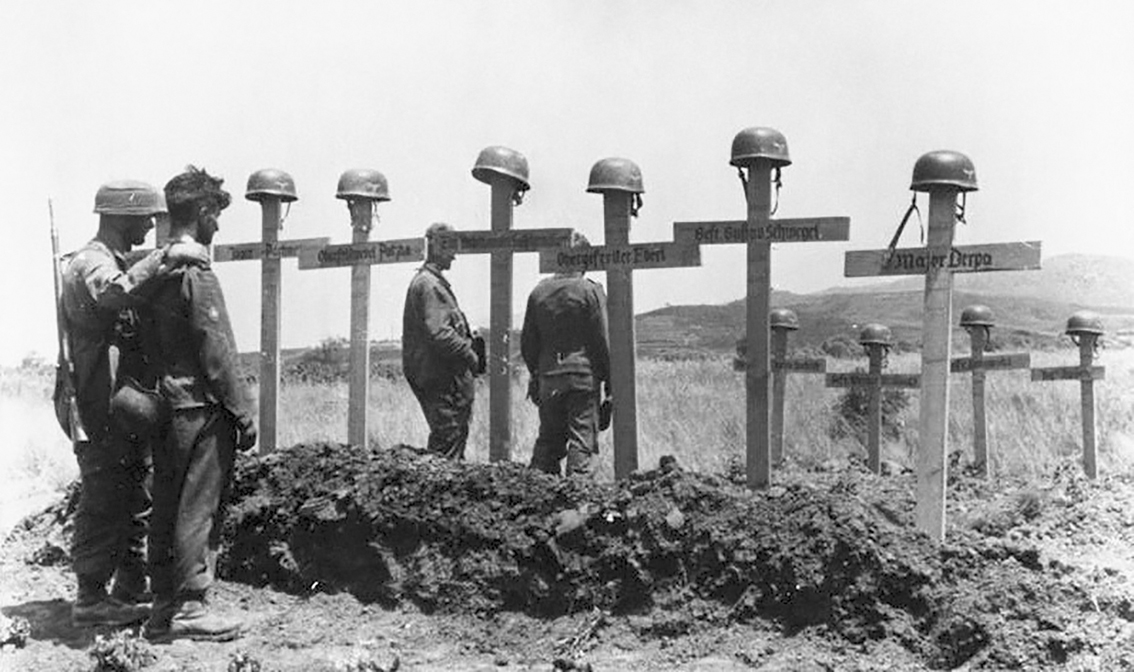
[Above: The Grave of heroes. Those that fell in the Battle of Crete (May 20, 1941 – Jun 1, 1941).]
Willi: Yes it is, just like the memo I saw, some on the island were criminals and guilty of very bad crimes. Many Fallschirmjäger who were wounded around Chania and countless other villages, were found tortured and mutilated. We could do this talk just about the crimes of the Cretans. As we Fallschirmjäger were landing, civilians, some armed by the Allies, began shooting at us. This is against the rules of war, and sentences the guilty to death. Even after the Allies fled, we still had to deal with Cretans who tried to continue the fight.
Today the Cretans are mainly silent on this, acting as if they were humble farmers who were victims of the bad Nazis. The truth is far different; these “victims” are actually the instigators of horrible crimes, which we had to punish them for. So many Germans were shot by civilians that we often call it the civilian war. I saw with my own eyes a whole platoon that had surrendered and was then stabbed and hacked to death; these were young 18-19 year old soldiers.
Other Fallschirmjäger units reported the same all over the island, even the mountain units had to deal with this. Sniping, grenade attacks, poisoned water, and wounded being attacked and killed. It was so bad in Chania, a New Zealand officer had to stop the killing of recently captured Fallschirmjäger. He was tried by us for war crimes, but found to have stopped the killings, so he was allowed to live. These people were animals, and I have no idea why. We did nothing to them to spark these type of crimes. We invaded their island to finish our war with Greece, and to remove the enemy. It was uncalled for for them to display such acts of barbarism.
Three brothers who jumped with us, landing by Heraklion; all died on the same day. It is said Cretans murdered the youngest and they hid his body, and then burned it. He was 17. We had to search each village after the fighting, looking for wounded or missing Fallschirmjäger, what we found were mutilated corpses, uniforms, some bloody, equipment and weapons taken from our men. Some Cretans aided us, and helped paint a picture: the Allies encouraged many civilians to help them and gave them weapons. When caught, they would lie like criminals, in spite of evidence, as if it was just a game.
We found many in several villages who had helped bury murdered Fallschirmjäger to hide the crimes. Our leaders ordered court-martials for military men and summary courts of civilians. The guilty who took up arms, who hid our weapons, or who were shown to have participated in the fighting or killings, were shot. In one instance, in Kondomari, 23 were shot down after a few tried to run away while their fate was being debated. A war reporter was sent to prison for actually aiding these people, we found out he was expelled from the SS for pro-Marxist views, and then his actions made sense. He went on to give terrible accounts after the war, vilifying us all for his piece of silver.
The British and their allies also committed crimes on Crete, and it was not the first time. I say this because they like to portray themselves as the honorable army who obeyed all rules of war. They were far from it, and I learned from comrades in France that men from the Waffen-SS who surrendered had been shot, along with Luftwaffe aircrews, and captured Fallschirmjäger. Nothing was written about it in the press because the Waffen-SS in turn shot some without formal trial as retaliation. I believe any crimes we are accused of, in reality were nothing but legal retaliation for Allied crimes.
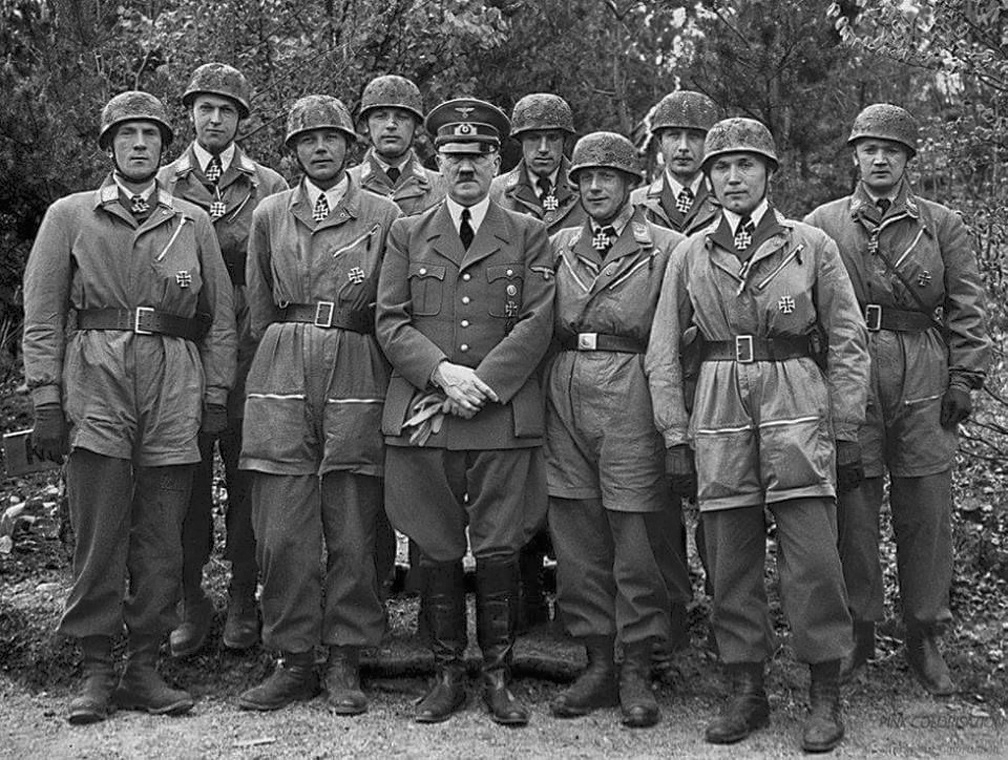
[Above: Adolf Hitler with his beloved Fallschirmjäger. They were miracle workers, rescuing Mussolini, and much more.]
Willi: Well to continue, after Crete we went back to refit, to a thunderous welcome. However, by now the war in the east had started and we were sent to the Eastern Front later that year. Lucky for me there were training courses, which saved me from being a permanent fixture in the east. By 1942, the war situation was not good; we fought all the world's powers and most knew we faced an impossible task. The Allied call for unconditional surrender made the prospect of peace a fleeting dream. We fought so that we could live free, not to become slaves to the plutocrats or Marxists.
Once Africa fell, and the landings on Sicily, more Fallschirmjäger were sent to Italy to hold the southern front. This is where I found myself in 1944, at Monte Cassino, a very old monastery. My company was located on what is called hill 593, a hill the Allies needed for victory. My men were organized into a perfect defensive position where we commanded large areas of the field. The fighting around Cassino was very brutal and unrelenting. You know the Allies bombed the monastery to the ground, they did not care one bit for Europe’s treasures. Contrary to propaganda, when we saw the area was going to have a battle, we got the civilians away, including the monks, but some would not leave. They later died by Allied bombs. We saved all the treasures from the monastery by removing them to caves for safekeeping, under Italian guards. Our positions came under attack from Gurkhas (who fought like savages), British, Poles, Americans, and every other nationality. Because of the prolonged attacks and clever defense of my men, I was put up for the award of the Knight's Cross, but it was the bravery of my men who it belongs to.
We held our line on that hill until there was nothing left to hold, and then we pulled back to new lines of defense. Sent to officer school and promoted to lieutenant, I sought new duties with my men, but now as commander of the third company with the rank of Hauptmann [captain] at war's end. I fought on most every front during the war, and am very lucky to have survived it all.
How was your treatment after surrendering?
Willi: It was with a heavy heart that I ordered my men to lay down their arms. While I was treated fairly for the most part, many Germans were not. I have to say that, as the world is silent about this today. No one knows that millions of Germans died after the war due to Allied policies. These included rape, starvation, ethnic cleansing, outright killings and abuse. We did nothing to deserve these things, but today our children and grandchildren are taught we deserved it -- in Germany!! The Allies actually invented stories or overstated legal reprisals to excuse their own crimes.
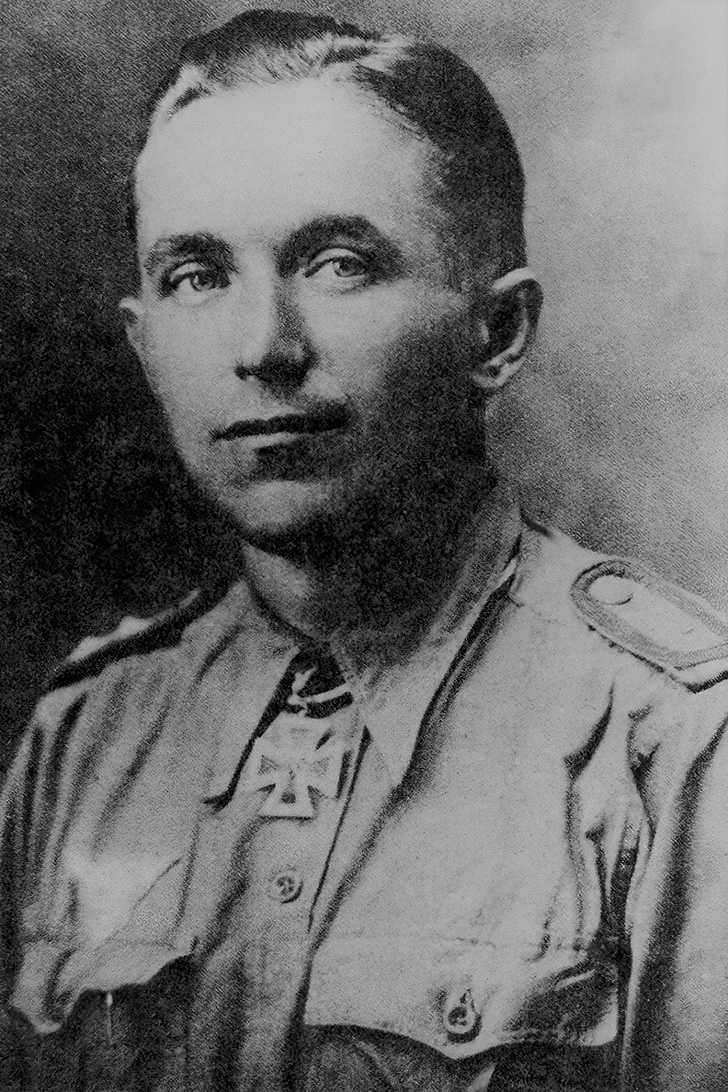
[Above: Willi Koch.]
[Above: The eternal Fallschirmjäger lives on.]
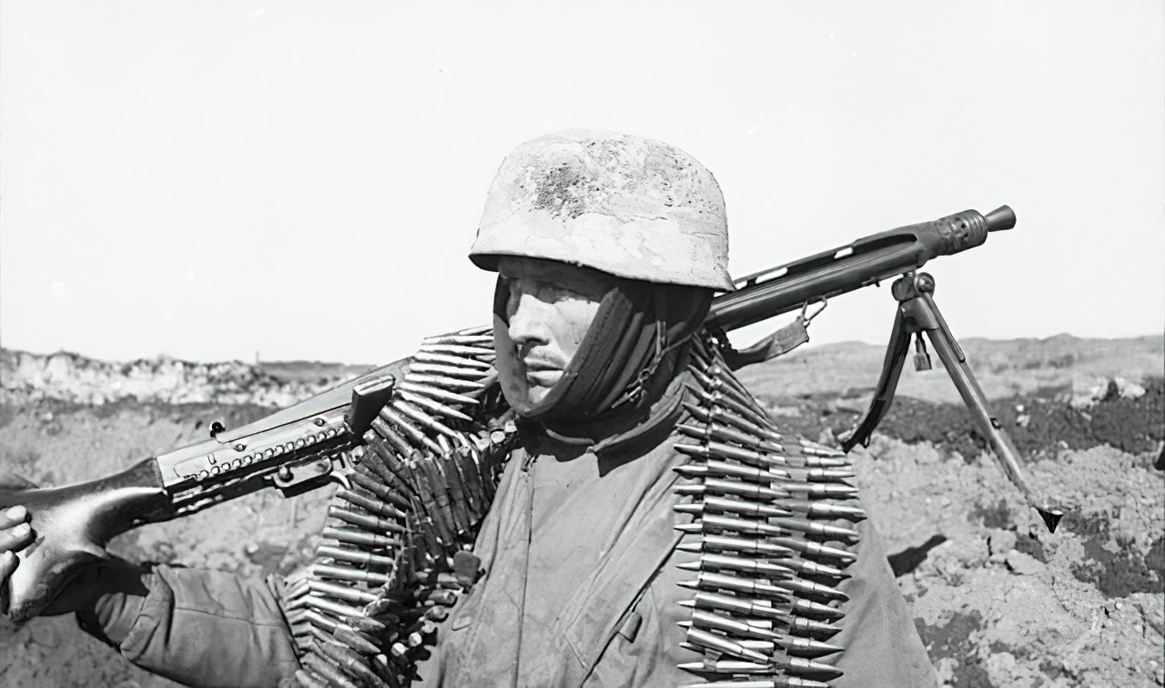
Back to Interviews